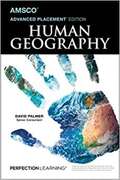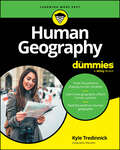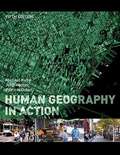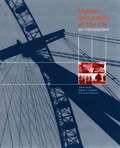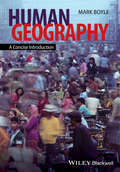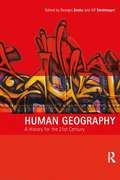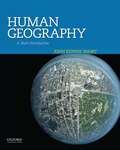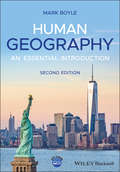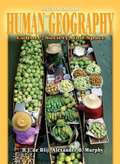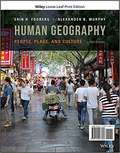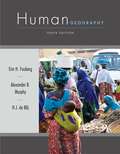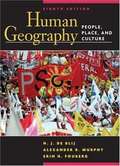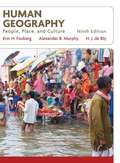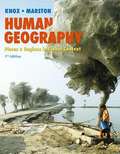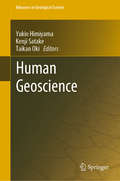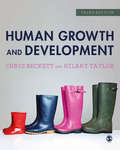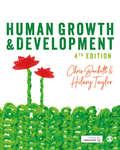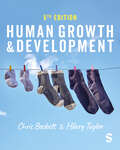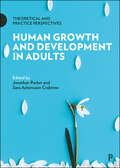- Table View
- List View
Human Geography
by David L. PalmerConcise and accessible text structured and written to follow the current AP Course and Exam Description. Examine how human behavior transforms the earth's surface in response to changing social, cultural, and political needs in short, focused sections. <P><P>The text covers all topic areas for the AP Human Geography course and examines current events and key theoretical areas such as environmental determinism and psychogeography.
Human Geography For Dummies
by Kyle TredinnickYour map to understanding human geography Human Geography For Dummies introduces you to the ideas and perspectives encompassed by the field of human geography, and makes a great supplement to human geography courses in high school or college. So what is human geography? It’s not about drawing maps all over your body (although you’re welcome to do that if you want—no judgment). Human geography explores the relationship between humans and their natural environment, tracking the broad social patterns that shape human societies. Inside, you’ll learn about immigration, urbanization, globalization, empire and political expansion, and economic systems, to name a few. This learner-friendly Dummies guide explains all the key concepts clearly and succinctly. Find out how location and geography impact population, culture, economics, and politics Learn about contemporary issues in human migration, health, and global peace and stability Get a clear understanding of all the key concepts covered in your introductory human geography class Understand how society got to where it is, and get a glimpse into potential changes in the futureHuman Geography For Dummies is perfect for students who need additional study materials or simplified explanations. It’s also a fun read for anyone curious about the comings and goings of people on this planet of ours.
Human Geography in Action
by Michael Kuby Patricia Gober John HarnerThe new fifth edition enhances coverage in the field by enabling economists and political geographers to work online with GIS maps, spreadsheets, simulations, and animated graphs. The book has been updated to use maps of traditional foods and vernacular phrases for soft drinks to illustrate culture regions. Expanded discussions of migration include a look at international immigration. New material is also presented on the local food movement and the breakdown in negotiations for agricultural trade agreements at the Doha trade summit. In addition, economists and political geographers will find key terms throughout the chapters such as creative class, outsourcing, substitution of capital for labor, and transit-oriented development.
Human Geography of the UK: An Introduction
by Eleonore Kofman Irene Hardill David GrahamThis new key textbook for introductory courses in human geography provides first and second-year undergraduates with a comprehensive thematic approach to the changing human geography of the UK at the end of the twentieth and beginning of the twenty-first century. Covering local, regional, national, European and global issues, it also explores in some detail topics which are part of the lived experience of undergraduates themselves, such as crime, unemployment, social exclusion and AIDS.User-friendly textbook features include:* chapter introductions, summaries and important theoretical principles* up-to-date further reading and key on-line sources* case studies, examples and revision questions.
Human Geography: A Concise Introduction (Short Introductions To Geography Ser.)
by Mark BoyleUsing the story of the “West and the world” as its backdrop, this book provides for beginning students a clear and concise introduction to Human Geography, including its key concepts, seminal thinkers and their theories, contemporary debates, and celebrated case studies. Introduces and applies the basic concepts of human geography in clear, concise, and engaging prose Explores the significance of the rise, reign, and faltering of the West from around the fifteenth century in the shaping of the key demographic, environmental, social, economic, political, and cultural processes active in the world today Addresses important thinkers, debates, and theories in an accessible manner with a focus on discerning the inherent Western bias in human geographical ideas Incorporates case studies that explore human geographies which are being made in both Western and non Western regions, including Latin America, Africa and Asia. Is written so as to be accessible to students and contains chapter learning objectives, checklists of key ideas, chapter essay questions, zoom in boxes, guidance for further reading and a book glossary. Accompanied by a website at www.wiley.com/go/boyle featuring, for students, tutorial exercises, bonus zoom in boxes, links to further learning resources and biographies of key thinkers, and for instructors, further essay questions, multiple choice exam questions, and ppt lecture slides for each chapter.
Human Geography: A History for the Twenty-First Century (Human Geography in the Making)
by Ulf Strohmayer Georges Benko'Human Geography' examines the major trends, debates, research and conceptual evolution of human geography during the twentieth century. Considering each of the subject's primary subfields in turn, it addresses developments in both continental European and Anglo-American geography, providing a cutting-edge evaluation of each.Written clearly and accessibly by leading researchers, the book combines historical astuteness with personal insights and draws on a range of theoretical positions. A central theme of the book is the relative decline of the traditional subdisciplines towards the end of the twentieth century, and the continuing movement towards interdisciplinarity in which the various strands of human geography are seen as inextricably linked.This stimulating and exciting new book provides a unique insight into the study of geography during the twentieth century, and is essential reading for anyone studying the history and philosophy of the subject.
Human Geography: A Short Introduction
by John Rennie ShortHuman Geography: A Short Introduction gives students a sense of the complex human geography of the contemporary world with a concise, focused format in an accessible, engaging style. The book is a foundation for college courses in human geography. Using detailed case studies to enliven broader arguments and comprehensive scholarship, Human Geography is the ideal choice for instructors who want the flexibility of a short primer without compromising on scholarly excellence. It is specifically designed to be augmented by the instructors. It provides a fresh update to Human Geography in a new and exciting manner. Features* Detailed and engaging case studies bring the book's broader arguments to life* Every chapter includes a list of further readings and websites for instructors and students* Priced at less than one third the cost of the best-selling books in the field, yet supported by strong graphics and supplements programs, this book represents unparalleled flexibility and value for both students and professors.
Human Geography: A Short Introduction
by John ShortThe book provides all the basics that students need while simultaneously empowering professors to customize their courses. Priced at less than one-third the cost of comparable books in the field, and supported by strong graphics and a robust support package, Human Geography.
Human Geography: A Spatial Perspective
by Sarah Bednarz Mark Bockenhauer Fred HiebertNIMAC-sourced textbook
Human Geography: An Essential Introduction (Short Introductions To Geography Ser.)
by Mark BoyleRevised, Extended, and Extensively Updated Text Uses Historical Geographical and Thematic Approach to Provide Undergraduates with a Firm Foundation in Human Geography Drawing on nearly three decades of instructional experience and a wealth of testing pedagogical innovations with students, Mark Boyle has revised and expanded this authoritative and comprehensive introduction to Human Geography. As with the First Edition, Boyle follows the premise that “history makes geography whilst geography makes history,” and that the key to studying the principal demographic, social, political, economic, cultural and environmental processes in any region in the world today is to look at how that region has been impacted by, and in turn has impacted, the story of the rise, reign, and decline of the West. Moreover he argues that Human Geography itself is best understood as both an intellectual endeavour and a historical, political, and institutional project. Informed by recent developments in post-colonial scholarship, the book covers key concepts, seminal thinkers, and influential texts in the field. Although designed for the beginner student, Boyle does not shy away from ideas and debates often avoided in introductory texts, clearly communicating theory without condescension. In addition, he places human geography in its larger academic context, discussing the influences on the field from related subjects. Notable features in the Second Edition include: Extensive revision and updating of coverage of key ideas, developments, debates and case studies New chapter on uneven geographical development at different scales and development theory and practice Dedicated coverage of Covid-19s geographies New learning resources (figures, tables, plates, maps, Deep Dive boxes, etc.) throughout the text, plus learning objectives, essay questions, checklists summarizing key ideas, and guidance for further reading Updated and expanded companion website with MP4 and MP3 chapter-by-chapter lectures and PowerPoint slides for each chapter, new multiple-choice exam paper and additional essay-style exam questions, and a wide range of student tutorial exercises Human Geography: An Essential Introduction, Second Edition is an excellent foundational text for undergraduate courses in human geography, globalization, Western civilization, historiographies of intellectual thought, the grand public problems confronting humanity in the twenty first century, and other wider social science courses.
Human Geography: Culture, Society, and Space
by H. J. de Blij Alexander B. MurphyAuthoritatively written by a geographer who has worked on every continent, Human Geography is sensitive to people of other cultures and from all walks of life. * Focuses on key geographic concepts and puts them in practical and current perspective. *
Human Geography: Landscapes of Human Activity
by Jerome D. Fellmann Arthur GetisTo introduce its users to the scope and excitement of geography and its relevance to their daily lives and roles as informed citizens.
Human Geography: People, Place, and Culture
by H. J. de Blij Erin H. Fouberg Alexander B. MurphyFouberg/Murphy: Human Geography: People, Places, and Culture 12th edition teaches students to appreciate the diversity of people, places, and cultures, and understand the role people play in shaping our world. The goals of this edition are to provide geographic context to global, regional, national and local issues and to teach students to think geographically and critically about these issues. Human Geography features beautifully designed maps, dozens of vibrant photographs taken by the author team, and author and guest field notes that help students see how geographers read cultural landscapes and use fieldwork to understand places. <p><p> Fouberg’s Human Geography, 12th Edition now integrates Threshold Concepts to help students develop their ability to think geographically. Once they learn and apply one of these concepts in the context of a given place, students integrate it into their thinking and can draw from it as they learn new material and explore other places.
Human Geography: People, Place, and Culture (10th edition)
by H. J. de Blij Erin H. Fouberg Alexander B. MurphyHuman Geography 10th Edition includes all of the important concepts and theory on Human Geography as previous issues with a more succinct and engaging narrative while going in depth to touch on all the major themes of the topic. The text focuses on identity and how every human being forges an identity in a globalized world. It includes recurring coverage of "identity" and how people make places and shape identities to see global, local and individual implications of decisions that people make every day. The main objective of this issue is to provide more understanding of human systems from a spatial perspective; ways to think globally; and ways to understand real-world implications of Human Geography. The text will help encourage a better understanding of how to create an identity in a globalized world and how decisions happen in a global context and can have global impacts.
Human Geography: People, Place, and Culture (8th edition)
by Harm J. de Blij Erin H. Fouberg Alexander B. MurphyHuman Geography: Culture, Society and Space challenges students to think geographically across scale and across a wide range of geographical phenomena and global issues. The authors engage the students throughout the text by posing geographical questions that encourage students to think critically about their own locality, region, nation, and world. In the Eighth Edition, the authors reformat the text to 14 chapters, provide a clear outline of key questions for each chapter, integrate their own field experiences, and rewrite the text to guide students through answers to geographic questions. The Eighth Edition includes three new chapters: 'Identity: Race, Ethnicity and Gender,' 'Local Culture, Popular Culture, and Cultural Landscapes,' and 'Geographic Networks. ' The concepts of globalization, identity, development, sense of place, and construction of scale are infused throughout the text. The author team draws from studies in geography and across disciplines to bring a broad and up-to-date perspective on the kinds of research geographers have done and are currently doing on a wide range of human geography topics. In the Eighth Edition, de Blij and Murphy welcome new coauthor Erin Hogan Fouberg (South Dakota State University), who brings her expertise in geography education and political geography. The author team created a new pedagogy and writing style for the Eighth Edition that make the book more accessible to students and faculty.
Human Geography: People, Place, and Culture (9th edition)
by Harm J. de Blij Erin H. Fouberg Alexander B. MurphyHuman Geography gets general readers to think geographically across scale and across a wide range of geographical phenomena and global issues. All concepts and themes are touched on with the historical background one would expect, but also with current examples to make the reading more relevant. The content is written in such a way that it is approachable and appealing. It includes all of the important themes in a succinct and engaging narrative style that can easily be understood. From the Field boxes and opening vignettes help anyone who has not personally traveled much of the world. General readers will also find the latest data as they build their understanding of important concepts.
Human Geography: Places And Regions In Global Context
by Paul Knox Sallie MarstonDescribed as “fresh, innovative, and intelligent,” Human Geography: Places and Regions in Global Context is acclaimed for its global approach, conceptual rigor, engaging real-world applications, and outstanding visual program. Knox and Marston foster awareness of current issues and developing trends from a geographic perspective, and provide a solid foundation in the fundamentals of human geography. <p><p> The authors integrate compelling local, regional, and global viewpoints to give meaning to people and places. By providing access to the latest ideas, concepts, and theories, the text deepens students’ understanding of the interdependence of places and regions in a globalizing world. The Seventh Edition extends Knox/Marston’s modern approach, integrating new technology as well as new visual and thematic features relevant to human geography today.
Human Geoscience (Advances in Geological Science)
by Taikan Oki Yukio Himiyama Kenji SatakeThis book is a product of the joint efforts of interdisciplinary academic fields under the integrative framework of human geoscience. Human geoscience is a new genre of geoscience concerned with the natural phenomena that occur on the surface of the Earth and their relations with human activities. It therefore has connections with many fields of geoscience, namely, physical geography, geomorphology, geology, soil science, sedimentology, seismology, volcanology, meteorology, climatology, oceanography, and hydrology. It also has strong links to the humanities, social sciences, agricultural sciences, and engineering related to disaster prevention or mitigation. All these disciplines are important fields for understanding disasters and global environmental problems and for evaluating the associated risks comprehensively, then proposing mitigation strategies.The volume is designed for those who may not necessarily have a geoscience background but have broad scientific interest in understanding the causes, mechanisms, and consequences of geo-disasters and global environmental problems and wish to make the world more sustainable on that basis. The book consists of six parts: I. Introduction, II. Earth Surface Realms, III. Natural Resources and Society, IV. Natural Hazards and Society, V. Global Environmental Problems, and VI. Global Sustainability Programmes and Human Geoscience, which discusses the contribution of this field of science to a new comprehensive framework for global sustainability.
Human Growth and Development
by Chris Beckett Hilary TaylorHuman Growth and Development, Second Edition is a bestselling introduction to emotional, psychological, intellectual and social development throughout the lifespan. Written for students training in fields such as Social Work, Healthcare and Education, the book covers topics which are central to understanding people whether they are clients, service users, patients or pupils. Each chapter outlines theories that explain development at different stages of life and the transitions we make between childhood, adolesence, adulthood and old age. For this second edition, a new chapter has been added (Chapter 10: It Takes a Village: the Sociological Perspective) exploring the wider social factors which influence human growth and development. Activities are provided within each chapter to help student test theoretical concepts against their own experience and intuitions. Combining theoretical concepts and reflective learning, Human Growth & Development, second edition is the ideal introduction to psychosocial development for students on a wide range of professional courses.
Human Growth and Development
by Chris Beckett Hilary TaylorWhat is it that determines what sort of person we become? Is a child’s future personality already determined at birth, or is a newborn baby like a blank sheet, waiting to be written on by life? Is our personality determined by anything, or do we choose for ourselves who we are, create ourselves out of nothing? This bestselling introduction to emotional, psychological, intellectual and social development throughout the lifespan will help you explore these questions and many more. Written for students training for careers in the helping professions, including nurses, social workers, occupational therapists, teachers and counsellors, the book covers topics which are central to understanding people whether they are clients, service users, patients or pupils. Following the shape of a human life, beginning with birth and ending with death, it combines theoretical concepts and reflective learning to help you develop an understanding of what makes human beings grow and change over their lives to inform your decisions and professional practice.
Human Growth and Development
by Chris Beckett Hilary TaylorWritten for students training for careers in the helping professions, the Fourth Edition covers all the essential topics central to understanding people whether they are clients, service users, patients or pupils. Following the shape of a human life, beginning with birth and ending with death, it combines theoretical concepts and reflective learning to your help students develop an understanding of what makes us grow and change over our lives. The NEW Online Case Study Resource - Tangled Webs Now you and your students can explore key issues and themes raised in the book and develop the skill of linking theory to practice with free access to a new online case study resource. By following the lives of people living in the fictional London Borough of Bexford, this series of interlinked and extended case studies will allow your students to explore complex situations, much as they might do as practitioners in their working lives, and consider what ideas about Human Growth and Development might inform their thinking and practice.
Human Growth and Development
by Chris Beckett Hilary TaylorWritten for students training for careers in the helping professions, the Fourth Edition covers all the essential topics central to understanding people whether they are clients, service users, patients or pupils. Following the shape of a human life, beginning with birth and ending with death, it combines theoretical concepts and reflective learning to your help students develop an understanding of what makes us grow and change over our lives. The NEW Online Case Study Resource - Tangled Webs Now you and your students can explore key issues and themes raised in the book and develop the skill of linking theory to practice with free access to a new online case study resource. By following the lives of people living in the fictional London Borough of Bexford, this series of interlinked and extended case studies will allow your students to explore complex situations, much as they might do as practitioners in their working lives, and consider what ideas about Human Growth and Development might inform their thinking and practice.
Human Growth and Development
by Chris Beckett Hilary TaylorOur bestselling social work textbook is back again. Taking you right back to basics, this book explains and analyses key theories in a really accessible way before going on to discuss, in detail, how theory can be incorporated into every day social work practice. Each chapter contains activities with step-by-step commentaries for discussion, self-analysis and critical reflection. The book very loosely follows the shape of a human life, beginning with a birth and ending with a death, but many of the chapters deal with ideas and topics that are relevant at many different stages of life, such as bereavement, attachment and learning. Its focus throughout is on psychosocial development – so psychological development within a social context – rather than physical development. This book is by Chris Beckett, a social work academic and novelist who previously worked in child and family social work, and Hilary Taylor, a psychotherapist and former social work academic who used to work in the field of social work with adults. It is the go-to guide for anyone studying for careers in the helping professions, such as nurses, social workers, occupational therapists, teachers and counsellors. It′s also supported by an online case study resource. Follow the lives of people living in the fictional London Borough of Bexford, with 12 extended case studies to help you explore key issues and themes raised in the book as well as develop the skill of linking theory to practice.
Human Growth and Development
by Chris Beckett Hilary TaylorOur bestselling social work textbook is back again. Taking you right back to basics, this book explains and analyses key theories in a really accessible way before going on to discuss, in detail, how theory can be incorporated into every day social work practice. Each chapter contains activities with step-by-step commentaries for discussion, self-analysis and critical reflection. The book very loosely follows the shape of a human life, beginning with a birth and ending with a death, but many of the chapters deal with ideas and topics that are relevant at many different stages of life, such as bereavement, attachment and learning. Its focus throughout is on psychosocial development – so psychological development within a social context – rather than physical development. This book is by Chris Beckett, a social work academic and novelist who previously worked in child and family social work, and Hilary Taylor, a psychotherapist and former social work academic who used to work in the field of social work with adults. It is the go-to guide for anyone studying for careers in the helping professions, such as nurses, social workers, occupational therapists, teachers and counsellors. It′s also supported by an online case study resource. Follow the lives of people living in the fictional London Borough of Bexford, with 12 extended case studies to help you explore key issues and themes raised in the book as well as develop the skill of linking theory to practice.
Human Growth and Development in Adults: Theoretical and Practice Perspectives
by Jonathan Parker and Sara Ashencaen CrabtreeUniquely wide-ranging in its coverage of key concepts, themes and issues relating to human growth and development in adults, this textbook explores the crucial challenges and transitions that adults negotiate in their lives. It examines key topics and issues within professional practice with adults and their families, covering a wide range of practice areas and fusing essential theory and research with practical application. Drawing on insights and debates from across sociology, psychology, criminology and aligned disciplines, this textbook is thoughtfully structured to provide an accessible and supportive resource. Key features include: • chapter-by-chapter summaries, case studies and practice examples; • active learning activities to consolidate knowledge; • a broad range of tools to develop critical thinking and reflective practice. With a companion volume that addresses children and young people, this is an essential tool for students and a valuable refresher resource for experienced practitioners.
